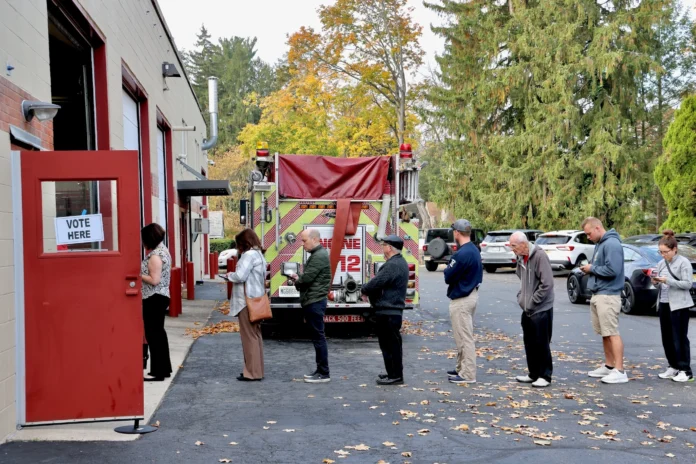New Jersey is once again in the national spotlight as one of only two states electing a new governor in 2025. With the primaries fast approaching and the general election looming, the race is becoming a defining moment for voters—not just in the Garden State, but across the country. In a political climate shaped by a revived Trump presidency, issues like immigration, housing, women’s rights, and economic stability are front and center in both parties. But what’s truly at stake is New Jersey’s direction for the next decade—and the power of leadership to reflect the values and diversity of its people.
Republicans Clash Over Trump, Immigration, and State Policy
The Republican primary has grown increasingly intense, with the top contenders sparring over loyalty to former President Trump, how to handle immigration enforcement, and what role the state should play in addressing housing shortages and affordability. In recent forums, GOP candidates made their positions clear: most align closely with national Republican talking points, doubling down on stricter immigration policies and seeking to roll back progressive state initiatives, including those that protect reproductive rights and renters.
These debates have exposed sharp divides within the party—some favoring traditional conservative governance, others echoing Trump’s populist rhetoric. What’s clear is that Republicans are preparing for a general election where turnout and messaging will be critical in a state that leans blue but has swung red in the past.
Democrats Focus on Ground Game, Equity, and Strategic Messaging
On the Democratic side, the competition is just as fierce—but the strategies are more targeted and data-driven. With public matching funds in play and Super PACs exerting significant influence, campaigns are walking a fine line between legal independence and strategic coordination. A popular tactic known as “redboxing”—posting voter targeting information and messaging cues in public campaign materials—has become a defining feature of the 2025 cycle.
Top Democratic contenders like Rep. Mikie Sherrill are using every available tool to build a broad coalition. Sherrill’s campaign is focused on face-to-face outreach and mobilizing key voting blocs, including Hispanic, AAPI, and white suburban women with a history of voting by mail. Her strategy is clear: bring in diverse, reliable voters who have turned out for Democratic primaries before and give them compelling reasons to do it again.
Sherrill’s digital materials also double as content for outside groups—highlighting her service as a Navy pilot, her legislative achievements, and her strong electoral track record. Unlike some of her rivals, she has consistently outperformed Democratic candidates above her on the ballot, a strong signal of her crossover appeal and electability.
Gender, Representation, and What’s at Stake for Women
Beyond electoral math, this race is also a test of how serious New Jersey is about achieving gender parity in leadership. With Virginia all but guaranteed to elect a woman governor this year, New Jersey has a chance to join the movement—and the stakes couldn’t be higher. Across the country, recent federal actions have undermined women’s rights, especially reproductive freedom. Having a governor who will defend—not dismantle—those protections is more urgent than ever.
Mikie Sherrill’s candidacy represents more than a resume; it’s a chance to elect a leader who brings both strength and empathy to the office. Her focus on working families, public safety, education, and economic justice reflects the priorities of the state’s diverse communities. But like many women in politics, she faces double standards. Her service is sometimes downplayed, her ambition questioned, and her experience scrutinized more harshly than her male counterparts. Yet the voters have consistently backed her—in overwhelming numbers.
Her opponents, including Newark Mayor Ras Baraka and Jersey City Mayor Steve Fulop, bring their own records to the race, but both struggle with voter engagement. Fulop underperformed in previous cycles compared to Governor Murphy, and Baraka’s tenure has coincided with a 64% decline in voter turnout in Newark’s local elections. These numbers raise concerns about their ability to energize voters statewide.
The Numbers Don’t Lie—And the Choice is Clear
In a year when many voters remain unaware that New Jersey’s primary is happening in June, mobilization matters more than ever. Recent polls show confusion about the election date, with only 4% correctly identifying June 10 as the primary day. Campaigns are racing against time to educate and engage voters in communities across the state.
Yet among all the contenders, Sherrill stands out for her ability to bring people to the polls and win tough races. In a political climate where turnout could determine whether New Jersey continues to be a progressive stronghold or veers sharply right, that track record is crucial. Democrats cannot afford to gamble on a nominee who hasn’t faced and beaten Republicans in competitive elections.
New Jersey voters have a critical opportunity—to make history by electing their first woman governor and to ensure the state remains a defender of equity, justice, and progress. As other states slip backward, New Jersey must move forward. This primary isn’t just about party politics—it’s about the soul of the state.
Are you ready to vote? Make sure you’re registered and informed before June 10. This is more than an election—it’s a turning point.











